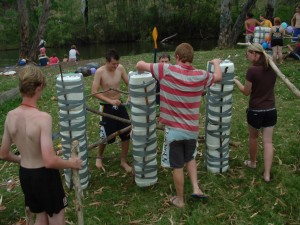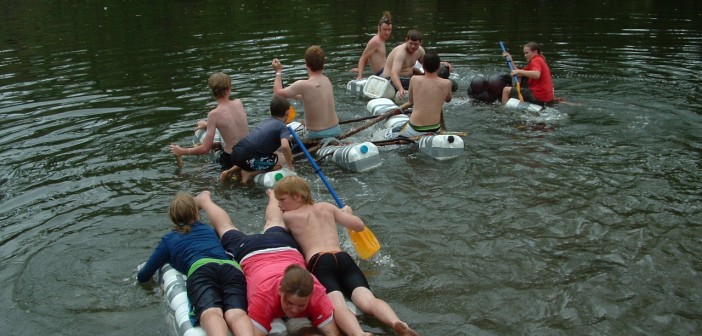Nigel Krueger is an experienced Youth Pastor, youth worker and School Chaplain, having worked in Hervey Bay and Biloela. Paul Dendle has also worked as a youth worker and School Chaplain in Middlemount. They have both lived in small rural towns and share a few of their insights into doing youth ministry outside of our big cities.
Churches all over the nation are seeing a slow decline in the retention rates of young people. Many of our smaller regional churches are even more prone and are simply ‘leaking’ young people, meaning that they’re simply dribbling out of our churches over time. More than ever before in history, healthy, creative and vibrant children and youth ministry is vital. So we would love to chat about some things that we have learnt over our time, and what we would encourage you to think about.
One common pitfall is trying to follow in someone else’s footsteps, by simply copying what they did. Youth ministry comes and goes in the bush, with whoever is around at the time. There might be a few years that there are a couple of wonderful youth leaders in your church, but after they’ve moved on you find yourself back to square one. If you’re taking over the responsibility of running a youth group after someone has left, there can be an expectation that you should be doing the same awesome stuff as the previous youth leader did. Don’t carbon copy them, just be you. That’s who and how God created you, otherwise you’ll just get disillusioned and worn out. There’s seems to be a sweet spot in youth ministry where the following three things intersect. YOUR gifts, YOUR passions and God’s heart. If you know what all three are, you’ll see great stuff happen. That’s why it’s so important that you understand where you’re gifted and where you’re NOT. Use your background, your life experiences and the unique gifts that God’s given you to be a faithful youth leader.
It can be disheartening looking at all of the different resources that larger churches have at their fingertips when you’re in a small struggling church. Forget it: simply focus on what you DO have not on what you DON’T have. God has placed each of us in our unique locations with all sorts of different opportunities, and some of the large churches in the city would be jealous of. It’s fabulous taking your youth group out camping on a local property particularly with waterholes and wildlife. We’ve found that local businesses are more than happy to share their resources and facilities if it’s for a ‘youth group’ activity. As much as possible look for things to do that are free. A couple of telescopes out on a property are a great way to spend a night discovering a small part God’s incredible galaxy. Fires are nice and warm in winter and water is cool in summer so make the most of what’s available locally.
 Find out what the local kids are into and set your youth group or kids club activities around their interests (unless it’s illegal!) It’s the best way to connect with them because it’s not about a sweet program but instead it’s just about building strong relationships with them. Their interests change over time so you need to be flexible and adaptable. No program is cool for every young person and if it’s your aim to run the coolest youth group, it’ll inevitably lose it’s cool after a while. The ‘coolness’ lies in your ability to create a place where young people can do three things.
Find out what the local kids are into and set your youth group or kids club activities around their interests (unless it’s illegal!) It’s the best way to connect with them because it’s not about a sweet program but instead it’s just about building strong relationships with them. Their interests change over time so you need to be flexible and adaptable. No program is cool for every young person and if it’s your aim to run the coolest youth group, it’ll inevitably lose it’s cool after a while. The ‘coolness’ lies in your ability to create a place where young people can do three things.
- Be somewhere that they feel safe – safe physically, emotionally, socially and spiritually
- Be with their friends (they mightn’t start out as friends, but over time you want to create opportunities for them to appreciate and understand each other)
- Be somewhere that they can call their own place (by letting them have a large say in what the youth program looks like)
The mission of discipling kids can look more like a mountain at times so just take small steps. Maybe plan to run a kids club for a term rather than a year, or have a goal of getting three kids along instead of hoping for a truckload. If God doesn’t give you stacks of youth leaders and a big annual budget, then He’s not expecting you to copy the sorts of programs delivered in the big smoke.
Keep your program simple. The more elaborate the activities are, the longer it takes to get set up and pack up. It’s a good idea to get the kids involved in actually setting up, catering, running some of the activities and of course, the good old packing up. The more they are integrally involved, the more they experience a sense of belonging.
Do what’s possible and give Him praise for it.
Young people love to learn how good God is through being ‘hands on’. There are always plenty of practical projects that you can get the kids into. It might be a local nursing home needing visitors, the shire council wanting some gardens beautified or a single parent needing their yard tidied up. In Queensland we suffer from all sorts of natural disasters from Cyclones, floods, drought, bushfires to name a few. Opportunities are aplenty for youth groups to help in some way during these times. It could be cooking for ‘BlaizeAid’ volunteers, cleaning up vegetation after a cyclone or putting pamper pack together to send out west. Young people learn heaps about God through meeting the needs of others, after all it’s one of the mandates that Jesus gave us.
And lastly, it’s so important to stay networked with others who are doing similar ministries. They might be 500 k’s away but it’s so good to connect. We all need to be encouraged and be an encouragement (and it’s great to steal ideas too!)
We think that wherever we are in Australia, especially for those of us in the bush or in rural areas, we know that God can use us with the kids that He has put right in front of us and it’s heaps of fun.




